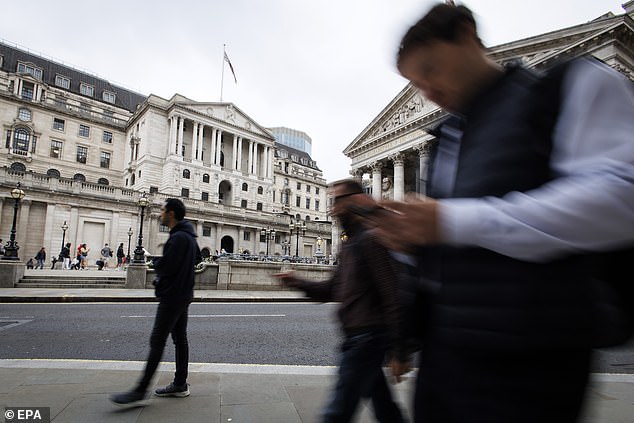Rachel Reeves was handed a boost ahead of her November Budget on Thursday after the Bank of England opted to slow the rate of its £558billion debt sell-off scheme.
It follows a sharp rise in long-term Government borrowing costs, which have placed even greater pressure on Britain’s fragile public finances and the Chancellor’s plans for the economy.
Members of the bank’s Monetary Policy Committee voted as expected to maintain base rate at its current level of 4 per cent, as concerns about inflation continue to outweigh evidence of weaker economic output.
Market attention instead was focused on the outlook for ‘quantitative tightening’ (QT) – a process that sees the BoE offload hundreds of billions of pounds worth of government bonds held on its balance sheet.
So-called quantitative easing (QE) saw the BoE amass £875billion in gilt holdings by its 2022 peak, having been forced to swoop in to buy bonds in the wake of the 2008 financial crisis, the aftermath of Brexit and during the pandemic.
QE effectively lowered long-term borrowing costs to support the economy and keep inflation down, but QT has piled further pressure on long-term government borrowing costs.

MPC members voted by a margin of 7-2 to reduce the rate of bond sales to £70billion
And 30-year gilt yields – the interest paid on government debt – have added 102 basis points over the last year, while 10-year yields are up by 76bps.
Yields, which move inversely to the price of a bond, largely reflect expectations for inflation – and therefore long-term interest rates – but it means the BoE is effectively selling into a market short on enthusiastic buyers.
This is compounded by new gilts coming into issuance to help pay for the Government’s spending priorities.
Long-term government borrowing costs matter not just for the country’s ability to finance it debts, but because they have a strong influence on mortgage rates.
Growing expectations that the BoE would move to slow the rate of bond sales from £100billion to around £72billion has helped to drive yields lower more recently.
At 5.42 per cent, 30-year yields are down 18bps over the last month while 10-year yields are down 13bps at 4.61 per cent.
And the BoE confirmed on Thursday that MPC members had voted by a margin of 7-2 to reduce the rate of sales from £100billion to £70billion over the next 12 months, leaving £488billion on its balance sheet.

QT: The BoE is unloading its enormous government bond holdings
The bank said: ‘[Higher long-term yields over the summer] reflected global economic policy uncertainty, high issuance of government bonds across countries and structural changes within the UK bond market that had reduced demand for long-term government debt.
‘Although the UK gilt market had continued to function in an orderly manner, these factors could pose a risk that QT would have a greater impact on market functioning than previously.’
Of the MPC dissenters, chief economist Huw Pill voted to maintain the rate of sales at £100billion, arguing it would demonstrate ‘continuity and consistency in the MPC’s approach, particularly as gilt market developments had been predominantly unrelated to QT’.
However, Catherine L Mann said the rate of sales should be reduced by even more to £62billion.
Mann thinks a ‘slower pace and balanced tenors would reduce the potential for volatility in short rates and would moderate upward pressure on the middle tenor interest rates, which was where monetary policy transmission was the strongest’.
Long-term gilt yields were flat for the day in early afternoon trading, reflecting the fact a reduction in the pace of QT was expected.
The value of gilts on the BoE’s Asset Purchase Facility balance sheet currently stands at £558billion.
Brad Holland, director of investment strategy at J.P. Morgan’s Nutmeg, said: ‘The bond curve on long-dated Gilts steepened over the summer and there are growing fears that further bond sales from the Bank could increase losses and trigger a further steepening of the curve.
‘For the Treasury, this would create an additional headache ahead of the Budget as any steepening of the curve has an impact on government borrowing.
‘These concerns have clearly motivated policymakers to re-examine its programme of bond sales as part of its annual assessment and slowdown sales.
‘Whether this proves to be a silver lining for the Treasury or not, we will need to wait and see if this loosening shifts the scales and leads to a decline in gilt yields. The jury is out for now.’
DIY INVESTING PLATFORMS

AJ Bell

AJ Bell
Easy investing and ready-made portfolios

Hargreaves Lansdown

Hargreaves Lansdown
Free fund dealing and investment ideas

interactive investor

interactive investor
Flat-fee investing from £4.99 per month

InvestEngine

InvestEngine
Account and trading fee-free ETF investing
Trading 212
Trading 212
Free share dealing and no account fee
Affiliate links: If you take out a product This is Money may earn a commission. These deals are chosen by our editorial team, as we think they are worth highlighting. This does not affect our editorial independence.
This article was originally published by a www.dailymail.co.uk . Read the Original article here. .

